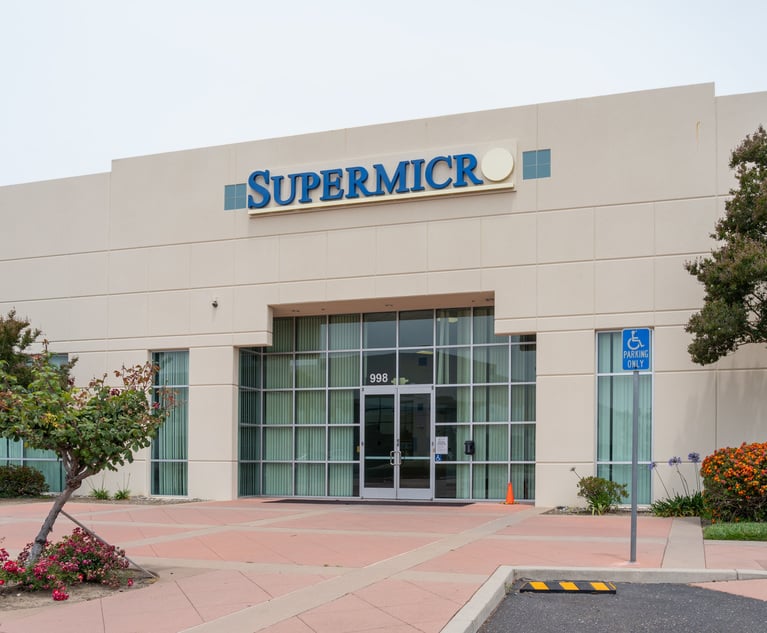Ripple Labs Bumps Up XRP Security Suit to Federal Court
Ripple Labs' counsel argues that a consolidated class action out of San Mateo County Superior Court is fair game for removal to federal court after a judge included a case brought on behalf of a class with 'no geographic limitations.'
November 08, 2018 at 07:07 PM
3 minute read
 Ripple XRP coins.
Ripple XRP coins.
Attorneys repping crypto outfit Ripple Labs have removed a consolidated Superior Court class action over the company's failure to register its XRP offering as a security to federal court.
In a notice of removal filed Wednesday, Skadden, Arps, Slate, Meagher & Flom litigation partner Peter Morrison argues that consolidated litigation against Ripple was rendered eligible for removal by a San Mateo Superior Court judge's merging of a suit brought by an Israeli resident into a larger California consolidated class action.
Because the merged suit was “brought on behalf of a worldwide class, with no geographic limitations,” Morrison argues, it fit removal requirements set under the Class Action Fairness Act.
Pursuant to the Class Action Fairness Act, Morrison writes, “a putative class action may be removed to the appropriate federal district court if (1) the action purports to be a 'class' action brought on behalf of 100 or more members; (2) any member of a class of plaintiffs is a citizen of a state different from any defendant; and (3) the amount in controversy exceeds $5 million.”
“This action meets each of those requirements,” writes Morrison.
The class actions against Ripple Labs stem from the company's issuance and distribution of its XRP token offering, which plaintiffs argue should have been registered as a security. Plaintiffs also accuse the company and its CEO of manipulating the price of Ripple to maximize profits from sales of its XRP tokens.
“Plaintiffs do not allege that they lacked information about the nature of these transactions,” Morrison writes. “Nevertheless, Plaintiffs claim that they were somehow injured because Defendants were allegedly required to register XRP as a 'security' with the [SEC] but failed to do so,” Morrison continues.
Neither Morrison nor plaintiffs attorneys from Robbins Arroyo LLP responded to requests for comment.
XRP, i.e. Ripples, is listed as the third-largest cryptocurrency in the overall marketplace, and the outcome of the class action could cease purchases and exchanges as well as determine the way the company's operations are regulated in the future. Plaintiffs in the San Mateo Superior case also alleged Ripple ran afoul of securities law by issuing a “never-ending initial coin offering.”
In addition to Skadden, Ripple also enlisted attorneys from Debevoise & Plimpton, including former SEC chair Mary Jo White and her enforcement chief Andrew Ceresney, to represent them in suits in both San Francisco and San Mateo Superior Courts.
Read more:
Ripple Labs Faces Third Securities Fraud Suit Over Its XRP Cryptocurrency
What Happens When a Cryptocurrency Becomes a Security? Major Disruption
Ripple Labs Brings on Former Top SEC Officials to Help Defend Private Securities Lawsuit
Read the notice of removal and consolidated complaint here:
This content has been archived. It is available through our partners, LexisNexis® and Bloomberg Law.
To view this content, please continue to their sites.
Not a Lexis Subscriber?
Subscribe Now
Not a Bloomberg Law Subscriber?
Subscribe Now
NOT FOR REPRINT
© 2025 ALM Global, LLC, All Rights Reserved. Request academic re-use from www.copyright.com. All other uses, submit a request to [email protected]. For more information visit Asset & Logo Licensing.
You Might Like
View All
California Walnut Grower and German Investment Firm Vie for Lead Plaintiff Status in Super Micro Securities Action

Judge Recommends Disbarment for Attorney Who Plotted to Hack Judge's Email, Phone
3 minute read

Orrick Hires Longtime Weil Partner as New Head of Antitrust Litigation
Trending Stories
- 1Uber Files RICO Suit Against Plaintiff-Side Firms Alleging Fraudulent Injury Claims
- 2The Law Firm Disrupted: Scrutinizing the Elephant More Than the Mouse
- 3Inherent Diminished Value Damages Unavailable to 3rd-Party Claimants, Court Says
- 4Pa. Defense Firm Sued by Client Over Ex-Eagles Player's $43.5M Med Mal Win
- 5Losses Mount at Morris Manning, but Departing Ex-Chair Stays Bullish About His Old Firm's Future
Who Got The Work
J. Brugh Lower of Gibbons has entered an appearance for industrial equipment supplier Devco Corporation in a pending trademark infringement lawsuit. The suit, accusing the defendant of selling knock-off Graco products, was filed Dec. 18 in New Jersey District Court by Rivkin Radler on behalf of Graco Inc. and Graco Minnesota. The case, assigned to U.S. District Judge Zahid N. Quraishi, is 3:24-cv-11294, Graco Inc. et al v. Devco Corporation.
Who Got The Work
Rebecca Maller-Stein and Kent A. Yalowitz of Arnold & Porter Kaye Scholer have entered their appearances for Hanaco Venture Capital and its executives, Lior Prosor and David Frankel, in a pending securities lawsuit. The action, filed on Dec. 24 in New York Southern District Court by Zell, Aron & Co. on behalf of Goldeneye Advisors, accuses the defendants of negligently and fraudulently managing the plaintiff's $1 million investment. The case, assigned to U.S. District Judge Vernon S. Broderick, is 1:24-cv-09918, Goldeneye Advisors, LLC v. Hanaco Venture Capital, Ltd. et al.
Who Got The Work
Attorneys from A&O Shearman has stepped in as defense counsel for Toronto-Dominion Bank and other defendants in a pending securities class action. The suit, filed Dec. 11 in New York Southern District Court by Bleichmar Fonti & Auld, accuses the defendants of concealing the bank's 'pervasive' deficiencies in regards to its compliance with the Bank Secrecy Act and the quality of its anti-money laundering controls. The case, assigned to U.S. District Judge Arun Subramanian, is 1:24-cv-09445, Gonzalez v. The Toronto-Dominion Bank et al.
Who Got The Work
Crown Castle International, a Pennsylvania company providing shared communications infrastructure, has turned to Luke D. Wolf of Gordon Rees Scully Mansukhani to fend off a pending breach-of-contract lawsuit. The court action, filed Nov. 25 in Michigan Eastern District Court by Hooper Hathaway PC on behalf of The Town Residences LLC, accuses Crown Castle of failing to transfer approximately $30,000 in utility payments from T-Mobile in breach of a roof-top lease and assignment agreement. The case, assigned to U.S. District Judge Susan K. Declercq, is 2:24-cv-13131, The Town Residences LLC v. T-Mobile US, Inc. et al.
Who Got The Work
Wilfred P. Coronato and Daniel M. Schwartz of McCarter & English have stepped in as defense counsel to Electrolux Home Products Inc. in a pending product liability lawsuit. The court action, filed Nov. 26 in New York Eastern District Court by Poulos Lopiccolo PC and Nagel Rice LLP on behalf of David Stern, alleges that the defendant's refrigerators’ drawers and shelving repeatedly break and fall apart within months after purchase. The case, assigned to U.S. District Judge Joan M. Azrack, is 2:24-cv-08204, Stern v. Electrolux Home Products, Inc.
Featured Firms
Law Offices of Gary Martin Hays & Associates, P.C.
(470) 294-1674
Law Offices of Mark E. Salomone
(857) 444-6468
Smith & Hassler
(713) 739-1250






